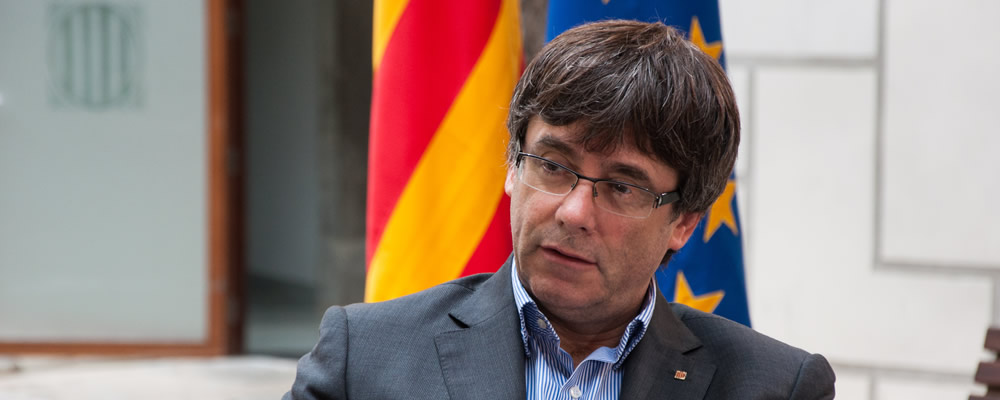- EUR AUD Exchange Rate Touches 1.52 – Trends near best levels since June 2016
- Catalonia Independence Concerns Lighten – Catalonia leader pledges negotiation with Spain
- EUR Forecast: ECB Officials Speak on Thursday – Fresh signals could drive Euro demand
- AUD Forecast: Could Risk-Aversion Persist? – ‘Aussie’ may be held back by low risk-sentiment
Thanks to low market appetite for risk-correlated currencies like the Australian Dollar, the EUR AUD exchange rate has advanced since Monday. Demand for the Euro has been stronger since Tuesday night saw Catalonia’s leader indicate he would rather negotiate with Spain than immediately declare independence.
EUR AUD began the week trading at the level of 1.5090. The pair has since gained around a cent, briefly hitting a fresh yearly high of 1.5203 on Wednesday but largely trending in the region of 1.51.
Euro (EUR) Strengthens as Catalonia Independence Fears Ease
The Euro saw weaker performance over the last week due to persistent political uncertainties, amid an unclear outcome to Germany’s 2017 federal election as well as rising concerns that Catalonia could attempt to declare independence from Spain.
While Catalonia’s independence referendum vote was called unconstitutional by Spanish officials, backlash from Catalonia against Spain was perceived to have worsened instability in the Eurozone’s fourth biggest economy.
On Tuesday, market concerns surrounding political instability in Spain eased, thanks to news that Catalonia President Carles Puigdemont has seemingly edged away from outright declaring independence, despite previous fears.
Instead, Puigdemont pledged to open negotiations with the Spanish government, bolstering hopes that the situation would be resolved diplomatically without Spain losing the Catalonia region – which accounts for 20% of its GDP.
Lukman Otunuga, research analyst from FXTM, noted that the Euro has strengthened on hopes for an agreement between the two sides;
‘A strong sense of relief was felt across financial markets on Tuesday evening, after Catalan leaders signed a “symbolic” declaration of independence, but immediately suspended its formal approval and called for talks with Madrid.
Although President Carles Puigdemont’s remarks disappointed many of his ardent supporters, who were hoping for a unilateral declaration of independence, his speech was music to investors’ ears, as this softer approach eased tensions.’
Spain’s Prime Minister, Mariano Rajoy, has asked for more clarity from Puigdemont, but for now markets are more comfortable to buy the Euro again.
Rising hopes that the European Central Bank (ECB) is planning to withdraw its quantitative easing (QE) scheme over the coming year has also left the shared currency appealing.
Australian Dollar (AUD) Fails to Hold against Euro Despite Strong Confidence Data
Following days of poor performance from the Australian Dollar, the currency did see a little more support on Tuesday and Wednesday – it has just been unable to hold its ground against a stronger Euro.
This has been despite this week’s Australian confidence surveys, which have largely beaten expectations.
NAB’s September business confidence survey improved from 5 to 7, beating forecasts of 6.
Westpac’s October consumer confidence survey was solid too. The confidence index rose from 97.9% to 101.35.
Rather than reacting to domestic news, Australian Dollar trade has been focused on central bank speculation and developments in recent sessions.
Low expectations for any hawkishness from the Reserve Bank of Australia, as well as bets that the European Central Bank (ECB) and Federal Reserve will tighten monetary policy in the Eurozone and US have left the Australian Dollar less appealing.
EUR AUD Exchange Rate Forecast: ECB Speeches on Thursday
Thursday will see many high-ranking officials from the European Central Bank (ECB) holding speeches, which could offer fresh forward guidance for Euro traders.
With the ECB’s October policy decision edging ever closer, any new signals from officials that the bank is preparing to begin withdrawing its quantitative easing (QE) scheme could keep the Euro buoyed.
In the afternoon, ECB President Mario Draghi and chief economist Peter Praet will hold speeches, followed in the evening by speeches from executive board members Benoit Coeure and Sabine Lautenschlager.
Of particular focus will of course be Draghi’s speech. Any new hawkish hints from the ECB President would make the Euro even more appealing towards the end of the week.
However, the shared currency could still be undermined by political news, if it emerges that Catalonia leader Carles Puigdemont did indeed intend to declare independence from Spain.
The Euro is likely to drive EUR AUD exchange rate in the coming sessions amid a lack of notable Australian ecostats.
Still, as investors have begun to buy the Australian Dollar again in recent sessions and the pair recently hit its best levels in over a year, further EUR AUD gains could be limited.
EUR AUD Interbank Rate
At the time of writing this article, the EUR AUD exchange rate trended in the region of 1.5170. The Australian Dollar to Euro exchange rate traded at around 0.6591.



